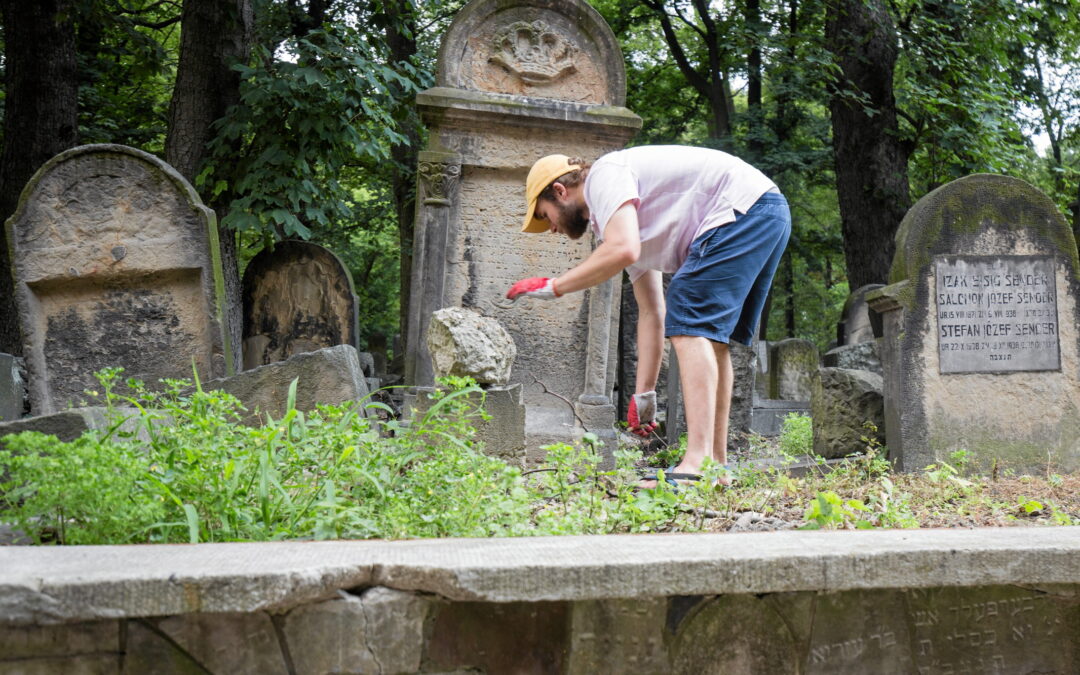Over 10,000 volunteers – ranging in age from four years old to 90 – joined campaigns to restore nearly 100 Jewish cemeteries across Poland as part of a concerted push last year.
The activities were coordinated by the newly founded Coalition of Guardians of Jewish Cemeteries in Poland, a network of organisations and activists caring for such sites.
Before the Holocaust, Poland was home to the largest Jewish community in Europe, over three million strong. Around 90% were killed under the German occupation, while many others fled during and after the war. Today, an estimated 20,000 Jews live in the country.
That has left a rich Jewish cultural heritage – including hundreds of cemeteries – with very few Jews to care for it. As a result, the maintenance of many Jewish sites relies on local communities and volunteers.
“The guardians see their activity as working…for their own identity and for the sake of building a broader awareness of the multicultural history of Poland,” said the Coalition of Guardians in a statement to Notes from Poland.
It has helped to coordinate many small-scale events across Poland, with the largest number taking place in the province of Silesia.
Over a dozen mayors have organised clean-ups in their cities, with four such events taking place in Silesia’s capital Katowice. An extremely neglected Jewish cemetery in Kraśnik was also recently cleaned up by volunteers who collected over 1,500 kilograms of rubbish at the site.
The coalition also helps caregivers obtain grants and donations, which came to a total of 300,000 zloty (€65,000) last year, including funds from the interior, culture and foreign ministries.
The newly established coalition is coordinated by the Cultural Heritage Foundation, an NGO that last year launched a mobile app allowing people to document abandoned cemeteries they encounter in order to build a database of forgotten burial grounds.
“When you connect separate actions into a network, it automatically generates new ones of a similar kind,” said Michał Laszczkowski, president of the foundation and initiator of the Coalition. “We already know of a dozen or so neglected cemeteries that may be covered next year too.”
One of the organisation’s most active members, Tadeusz Ołubek, has for four years organised several cleaning efforts at the Jewish necropolis in Łódź, which at 45 hectares is the largest in Poland. As a probation officer, he has employed people sentenced to community service.
Similar efforts have been undertaken at Poland’s second-largest Jewish cemetery, on Okopowa street in Warsaw. There, 27 events employing 600 volunteers took place in 2021 to clear leaves and soil from tombstones.
According to the organisation’s figures, there are some 800 surviving Jewish cemeteries in Poland today. Before the Second World War there were reportedly 1,200 such sites in Poland’s modern-day territory, but many were devastated during the war or liquidated by the subsequent communist authorities.
Other organisations have also been working in Poland to unearth the Jewish heritage at such sites. A database of Jewish cemeteries in Poland has been founded to catalogue all inscriptions on tombstones.
Occasional acts of vandalism also occur, however. In 2021 several dozen tombstones at the Jewish cemeteries in Wrocław and Bielsko-Biała were devastated.
Main image credit: Katarzyna Bednarczyk / Agencja Gazeta

Maria Wilczek is deputy editor of Notes from Poland. She is a regular writer for The Times, The Economist and Al Jazeera English, and has also featured in Foreign Policy, Politico Europe, The Spectator and Gazeta Wyborcza.




















